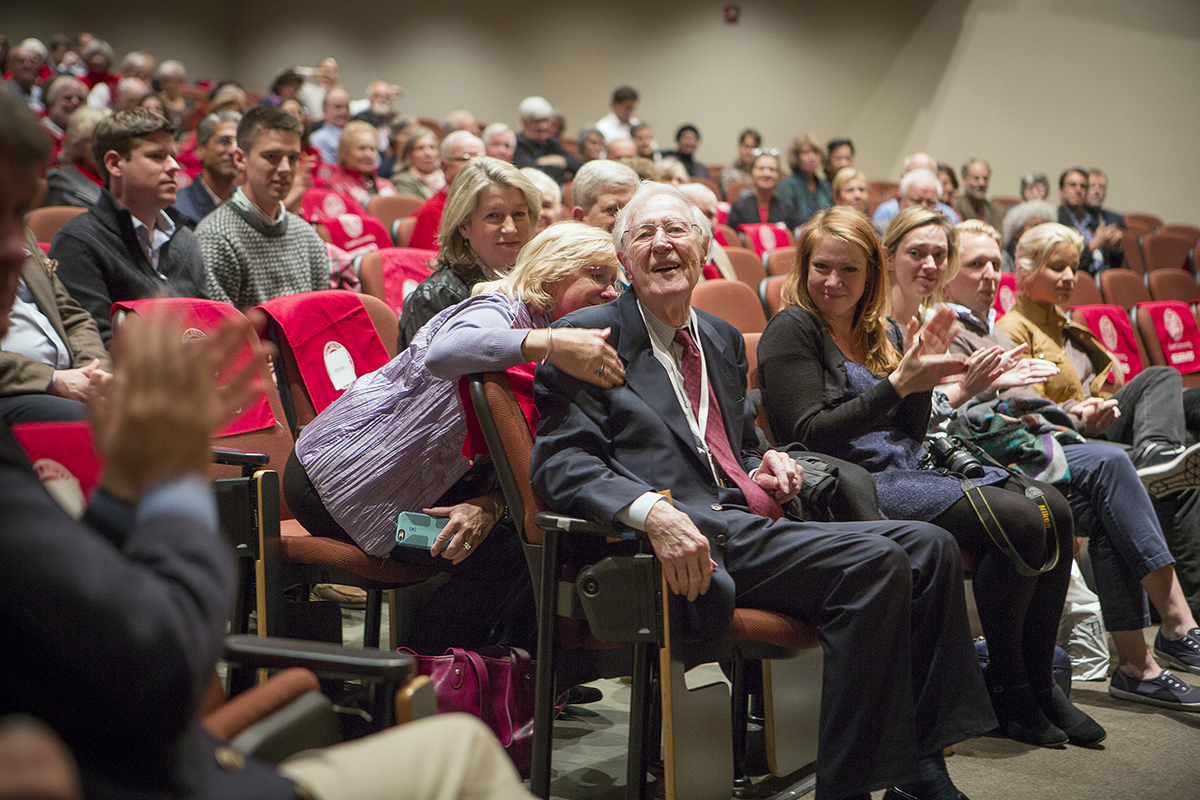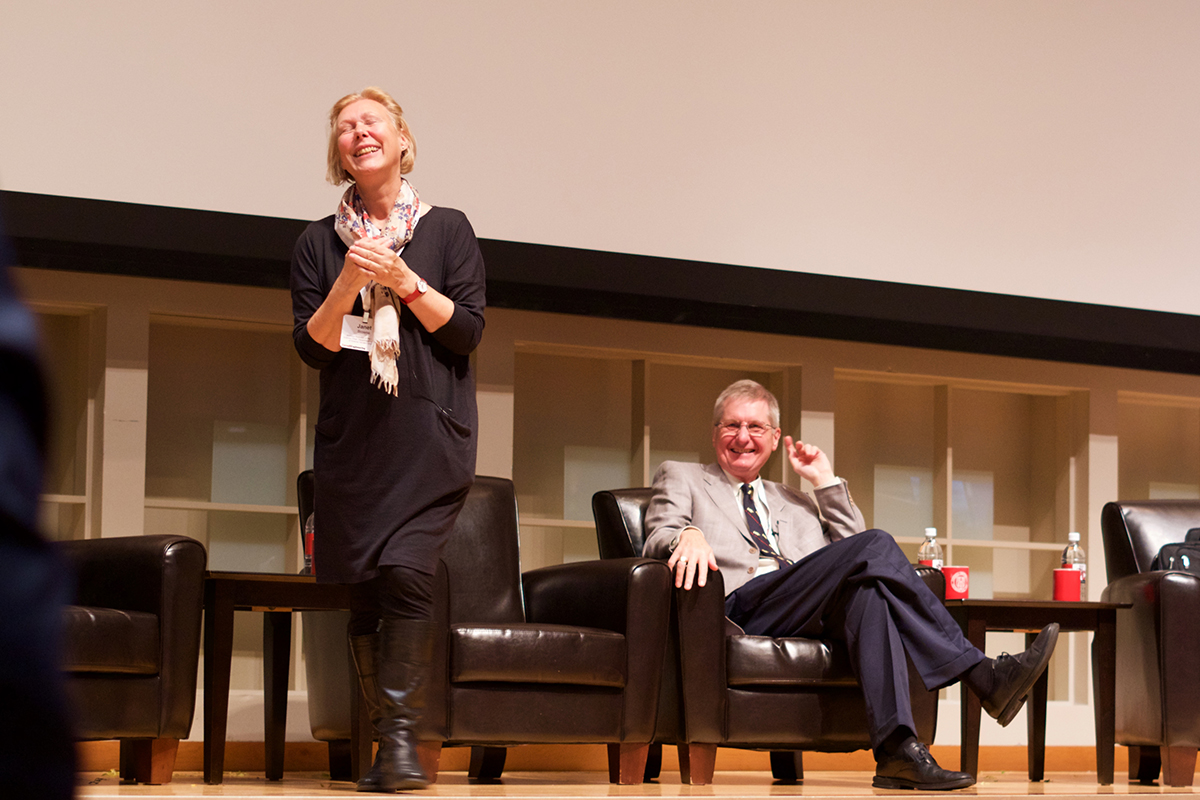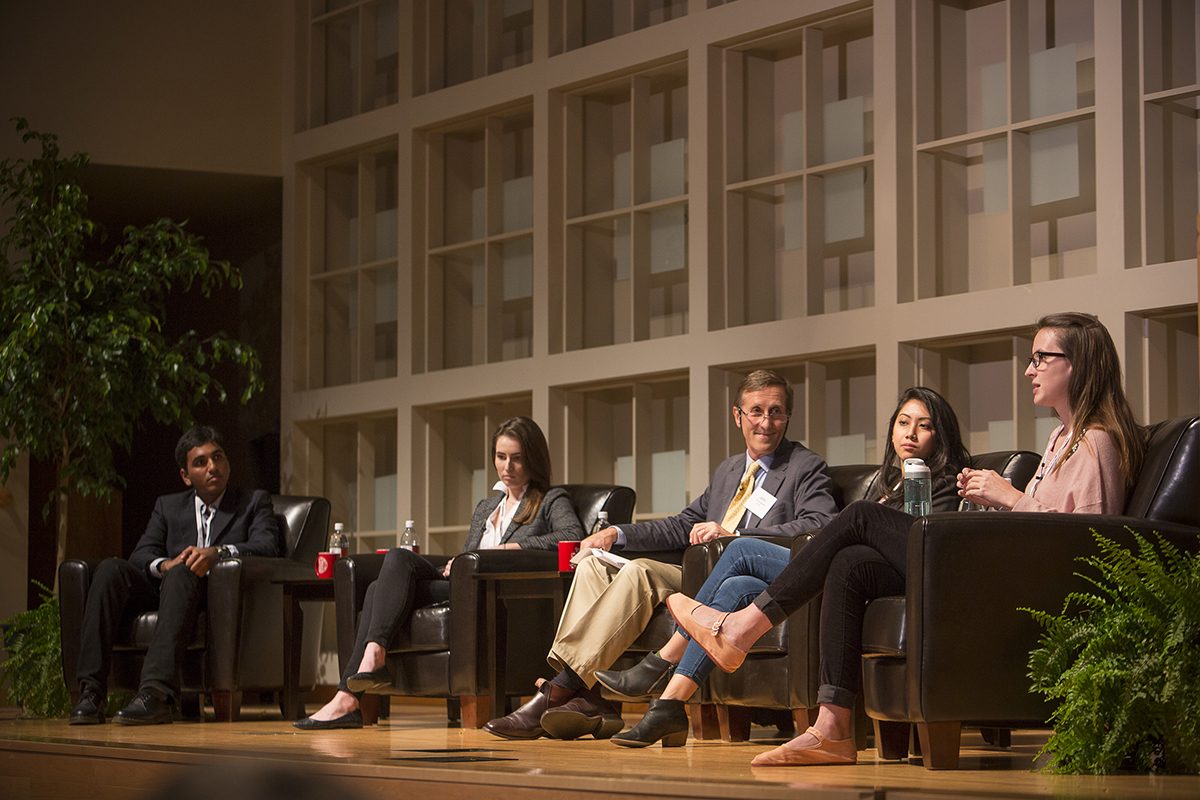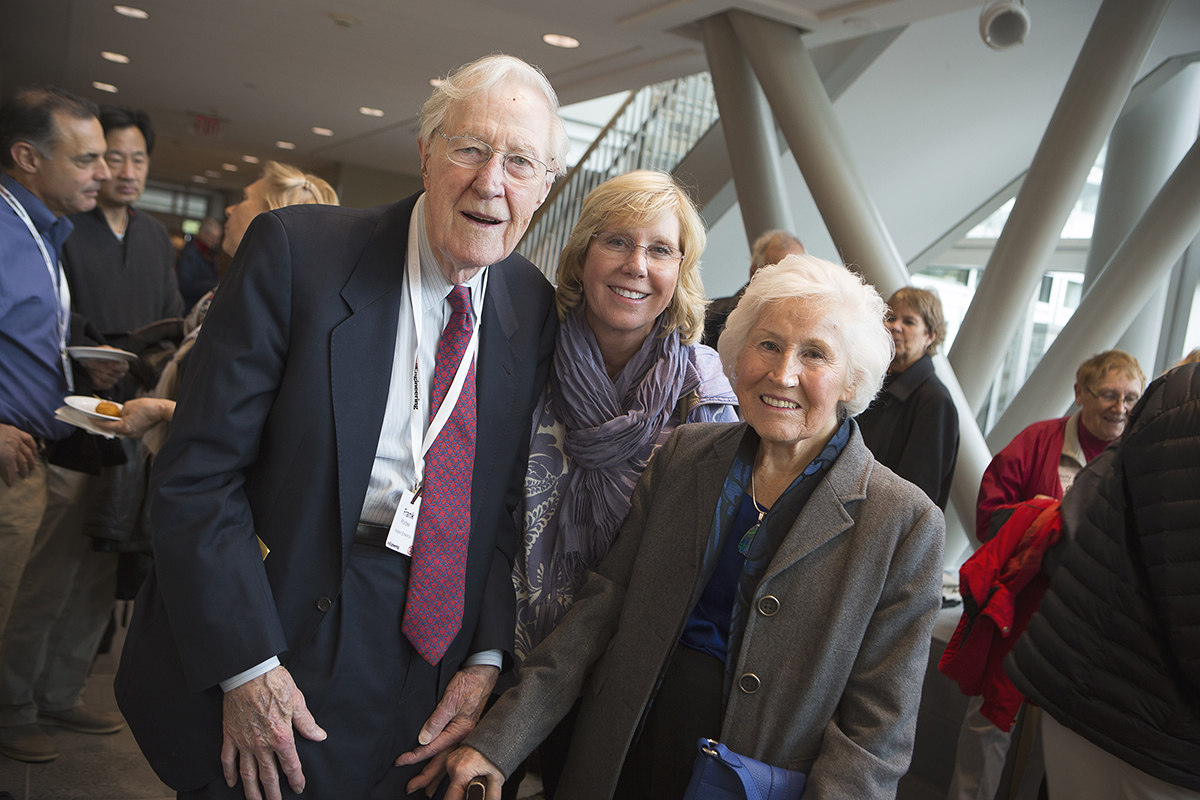Frank H.T. Rhodes, at 90, honored for academic impact
By Joe Wilensky

A symposium and celebration was held Oct. 29 to honor President Emeritus Frank H.T. Rhodes on his 90th birthday.
Family members, colleagues, students, alumni and university leaders gathered in Statler Auditorium to mark the academic impact Rhodes has had in his field and to celebrate the intellectual cornerstones of his career. Rhodes is a professor of geologic science, Darwin scholar and author of many books and publications, including “Origins: The Search for Our Prehistoric Past,” released last month.
Lance Collins, the Joseph Silbert Dean of the College of Engineering, welcomed guests, noting that Oct. 29 is not just Rhodes’ birthday but also is officially Frank H.T. Rhodes Day in the city of Ithaca (a proclamation issued by former Ithaca Mayor Alan Cohen ’81 in 1996).

Calling Rhodes a “true scholar,” Collins said the symposium “will examine some of the fields [in which] Frank has had a tremendous influence” – paleontology, evolution and sustainability. He noted Rhodes’ leadership as Cornell’s ninth president from 1977-95 and the many initiatives he led that continue to shape Cornell today.
“In some sense, he paved the way for Cornell’s modern era of research in areas such as supercomputing, biotechnology and nanofabrication sciences,” Collins said, adding that Cornell’s international presence was strengthened, new alliances with industry were built and research funding more than tripled during Rhodes’ 18 years as president.
Warren Allmon, the Hunter R. Rawlings III Professor of Paleontology and director of the Cornell-affiliated Paleontological Research Institution in Ithaca, said that in planning the symposium, those putting it together decided to focus not on Rhodes’ presidency and national academic leadership but on his career as a paleontologist, Darwin scholar and as a listener to Cornell students.
Early work set academic approach
Derek Briggs, the G. Evelyn Hutchinson Professor of Geology and Geophysics and curator in charge of invertebrate paleontology at the Yale Peabody Museum of Natural History, spoke about Rhodes’ work in the 1950s and ’60s on microfossils known as conodonts, which had long been useful as index fossils for working out the relative ages of Paleozoic rocks. But conodonts were unknown biologically – only fragments of their structures existed, and for decades they had puzzled scientists.
As a postdoctoral researcher, Rhodes published several papers (and his dissertation) on conodonts, proposing new theories on their origins and assemblage and giving them new species names (theories that largely pointed the way to modern understanding of the eel-like marine creatures).
Rhodes’ work in paleontology and on conodonts also has illuminated, delineated and helped explain the mass extinction that defined the end of the Paleozoic Era, Briggs said.
Tying geologic changes to species development

Janet Browne, the Aramont Professor of the History of Science and chair of the Department of the History of Science at Harvard University, is known as the world’s foremost Darwin scholar.
She described how Rhodes has contributed to a greater historical understanding of Darwin – seeing his early, hands-on scientific work as a geologist and naturalist as foundational to his later evolutionary theory – and in helping to support the Darwin Correspondence Project, which seeks to further understand Darwin through thousands of letters to and from his friends, colleagues and scientific societies, which helped Darwin shape, debate and test his ideas.
Browne cited Rhodes’ 1991 paper, “Darwin’s Search for a Theory of the Earth: Symmetry, Simplicity and Speculation” (British Journal for the History of Science), which marked the 150th anniversary of the publication of Darwin’s first major scientific theory and tied Darwin’s early geologic research on the formation of mountains and continental elevations to his later views on the origin of species.
“It’s the idea that many things are all interconnected, and also that many small things, adding up over a very large period of time, can make extremely substantial changes,” Browne said, noting that Rhodes’ scientific approach is similar. “It’s the essence of Darwin’s principle of evolution by natural selection.”
Student panel discusses ‘Earth’ and sustainability
A student panel, introduced by Rick Allmendinger, chair of the Department of Earth and Atmospheric Sciences, discussed current attitudes toward sustainability and pressing issues facing humans based on a discussion of Rhodes’ 2012 book, “Earth: A Tenant’s Manual.”
Discussing whether people have the capability to change behavior that threatens the planet’s resources, Hannah Lang ’18, a science of earth systems major, quoted from the book: “A trend is not destiny.” Humans understand that we have the capability to learn what we need to do to make effective changes, she said.
On turning 90
“The origin of this word, ‘emeritus,’ may interest you,” Rhodes said at the symposium’s end. “‘E’ means you’re out, and ‘meritus’ means you deserve to be.” Rewarded with collegial laughter, Rhodes thanked everyone for coming, noting that many of his family members, including children and grandchildren, were in attendance. And he thanked the student panelists, noting, “the world is in good hands.”

He thanked his wife, Rosa, “who, for many years, has been the mainstay of my life, who’s been my confidante, my best friend, my adviser, my mentor, my inspiration. Rosa, bless you.”
Asked if he had any thoughts on longevity or advice on remaining actively engaged at the age of 90, Rhodes said: “I really think it’s having a supportive family. I can’t imagine how you’d survive if you didn’t have that. So I’m very grateful for it.”
The symposium, and a following reception, was co-hosted by the Department of Earth and Atmospheric Sciences, the Department of Ecology and Evolutionary Biology, and the Paleontological Research Institution.
Media Contact
Get Cornell news delivered right to your inbox.
Subscribe